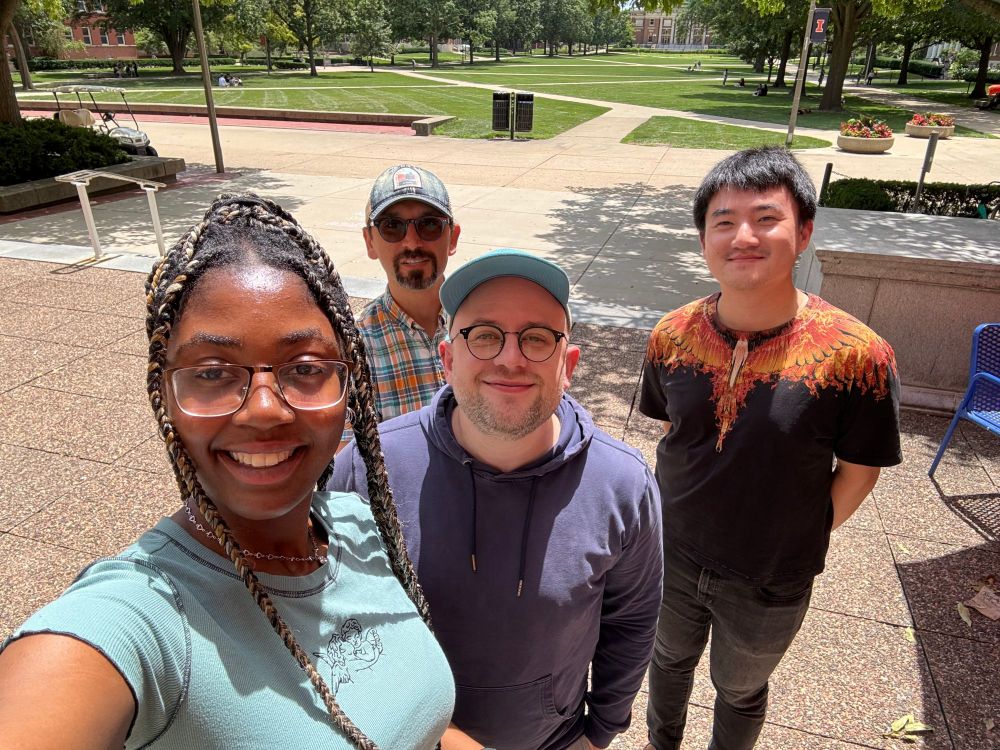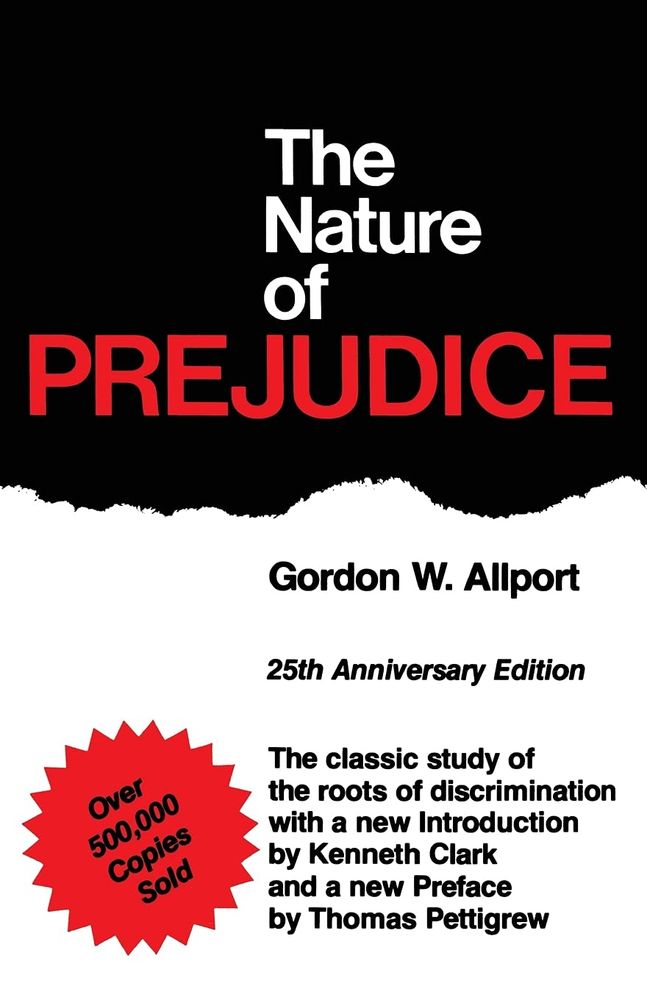
Benedek Kurdi
@benedek.bsky.social
Experimental psychologist studying social learning and memory, assistant professor @psychillinois.bsky.social, SAB chair @projectimplicit.bsky.social, AE at JEP:G, immigrant, 🏳️🌈, he/him
An interview with @news.illinois.edu about the possibilities of change in implicit bias and the opportunities and pitfalls of implicit bias education:
news.illinois.edu/is-unintenti...
news.illinois.edu/is-unintenti...

October 22, 2025 at 2:52 PM
An interview with @news.illinois.edu about the possibilities of change in implicit bias and the opportunities and pitfalls of implicit bias education:
news.illinois.edu/is-unintenti...
news.illinois.edu/is-unintenti...
Preprint led by Salvador Vargas (on the job market!), with Chadly Stern, on stereotypes linking race & social class. We find a mean-level White–rich/Black–poor stereotype; the stereotype is strongest among third-group participants; and likely explained by social sampling: osf.io/preprints/ps...

October 16, 2025 at 1:28 PM
Preprint led by Salvador Vargas (on the job market!), with Chadly Stern, on stereotypes linking race & social class. We find a mean-level White–rich/Black–poor stereotype; the stereotype is strongest among third-group participants; and likely explained by social sampling: osf.io/preprints/ps...
Implicit bias education has gotten a bad rap recently (and for some very good reasons), but in this paper (newly out in PIBSS) I argue that it could have value if done differently: doi.org/10.1177/2372... (Still also available as a preprint: osf.io/preprints/ps...)

October 14, 2025 at 6:38 PM
Implicit bias education has gotten a bad rap recently (and for some very good reasons), but in this paper (newly out in PIBSS) I argue that it could have value if done differently: doi.org/10.1177/2372... (Still also available as a preprint: osf.io/preprints/ps...)
@psychillinois.bsky.social Social Cognition Lab, fall 2025

September 16, 2025 at 11:06 PM
@psychillinois.bsky.social Social Cognition Lab, fall 2025
In this invited piece for PIBBS I argue that implicit bias education is not inherently worthless but often ineffective (counterproductive) in its current form. I offer recommendations to improve it by making it measurable, agentic, integrated, broad, & evidence-based (MAIBE): osf.io/preprints/ps...

August 12, 2025 at 5:40 PM
In this invited piece for PIBBS I argue that implicit bias education is not inherently worthless but often ineffective (counterproductive) in its current form. I offer recommendations to improve it by making it measurable, agentic, integrated, broad, & evidence-based (MAIBE): osf.io/preprints/ps...
Happy cat day from Zsa Zsa!

August 8, 2025 at 11:04 PM
Happy cat day from Zsa Zsa!
Updated preprint with Zephyr Weinreich, @yarrowdunham.bsky.social, and @ericman.bsky.social showing that implicit attitudes are not only sensitive to negation; they even reflect the distinction between easy-to-negate bipolar and difficult-to-negate unipolar adjectives: osf.io/preprints/ps...


July 1, 2025 at 10:31 PM
Updated preprint with Zephyr Weinreich, @yarrowdunham.bsky.social, and @ericman.bsky.social showing that implicit attitudes are not only sensitive to negation; they even reflect the distinction between easy-to-negate bipolar and difficult-to-negate unipolar adjectives: osf.io/preprints/ps...
Wonderful end-of-semester party yesterday. I love being a part of this community.

May 1, 2025 at 1:01 PM
Wonderful end-of-semester party yesterday. I love being a part of this community.
What is more, this sensitivity was even modulated by whether adjectives are easy to negate (e.g., “strong” or “stingy”) or difficult to negate (e.g., “special” and “sinful”). The results generalized across two sets of adjectives, two novel targets, and two measures of implicit attitudes.

February 21, 2025 at 5:56 PM
What is more, this sensitivity was even modulated by whether adjectives are easy to negate (e.g., “strong” or “stingy”) or difficult to negate (e.g., “special” and “sinful”). The results generalized across two sets of adjectives, two novel targets, and two measures of implicit attitudes.
🚨🚨🚨 Preprint with Zephyr Weinreich, @yarrowdunham.bsky.social, and @ericman.bsky.social in which we show that implicit attitudes are not only sensitive to negation; they even reflect the distinction between easy-to-negate bipolar and difficult-to-negate unipolar adjectives: osf.io/preprints/ps...

February 21, 2025 at 5:56 PM
🚨🚨🚨 Preprint with Zephyr Weinreich, @yarrowdunham.bsky.social, and @ericman.bsky.social in which we show that implicit attitudes are not only sensitive to negation; they even reflect the distinction between easy-to-negate bipolar and difficult-to-negate unipolar adjectives: osf.io/preprints/ps...
Very excited to be starting as an associate editor at JEP:G this year. Ever since year 1 of grad school, JEP:G has been my favorite journal, and so this is a massive pinch-me moment for me. This would not have been possible without the editorial fellows program, which I'm very happy to chat about!

January 2, 2025 at 2:59 PM
Very excited to be starting as an associate editor at JEP:G this year. Ever since year 1 of grad school, JEP:G has been my favorite journal, and so this is a massive pinch-me moment for me. This would not have been possible without the editorial fellows program, which I'm very happy to chat about!
Very heavily updated preprint with Tessa Charlesworth and Patrick Mair on international trends in explicit and implicit social group attitudes (2009–2019) using 1.4 million+ participants from 33 countries in the @projectimplicit.bsky.social International Dataset: psyarxiv.com/jmg7c/.

December 10, 2024 at 11:39 PM
Very heavily updated preprint with Tessa Charlesworth and Patrick Mair on international trends in explicit and implicit social group attitudes (2009–2019) using 1.4 million+ participants from 33 countries in the @projectimplicit.bsky.social International Dataset: psyarxiv.com/jmg7c/.
This is for my students 🤫

December 5, 2024 at 2:43 PM
This is for my students 🤫
Because they are not, we believe that the classic idea that implicit attitudes reside (mostly) beyond conscious awareness is probably accurate, or at the very least should not be dismissed just yet.

November 21, 2024 at 9:00 PM
Because they are not, we believe that the classic idea that implicit attitudes reside (mostly) beyond conscious awareness is probably accurate, or at the very least should not be dismissed just yet.
Long story short: Mean-level predictions were in line with explicit (not implicit) attitudes and nearly all individual-level correlation between predicted and actual implicit attitudes was explained by participants where we didn't manage to create an explicit–implicit dissociation.

November 21, 2024 at 9:00 PM
Long story short: Mean-level predictions were in line with explicit (not implicit) attitudes and nearly all individual-level correlation between predicted and actual implicit attitudes was explained by participants where we didn't manage to create an explicit–implicit dissociation.
Very excited to share this preprint with @thatadammorris.bsky.social and (newly minted ISCON Early Career Award winner) David Melnikoff in which we reexamine the question of whether people are aware of their implicit attitudes. TLDR: most likely not. psyarxiv.com/gak52/ For details, see 🧵 below.

November 21, 2024 at 9:00 PM
Very excited to share this preprint with @thatadammorris.bsky.social and (newly minted ISCON Early Career Award winner) David Melnikoff in which we reexamine the question of whether people are aware of their implicit attitudes. TLDR: most likely not. psyarxiv.com/gak52/ For details, see 🧵 below.
I want to leave Twitter sometime this week. Any recommendations on how best to do this? Delete account? Delete posts? Remove followers? Keep handle? Kill handle? I’m too confused right now about the many options that are available and would appreciate some advice.

November 11, 2024 at 8:03 PM
I want to leave Twitter sometime this week. Any recommendations on how best to do this? Delete account? Delete posts? Remove followers? Keep handle? Kill handle? I’m too confused right now about the many options that are available and would appreciate some advice.
I will be reading applications for our PhD program this year. Our lab studies social cognition, attitude formation and change, and social learning and memory. For more information, please read this document: benedekkurdi.com/files/Kurdi_.... The deadline is December 1.

November 4, 2024 at 3:56 PM
I will be reading applications for our PhD program this year. Our lab studies social cognition, attitude formation and change, and social learning and memory. For more information, please read this document: benedekkurdi.com/files/Kurdi_.... The deadline is December 1.
Bluesky now has over 10 million users, and I was #831,120!

September 17, 2024 at 12:57 AM
Bluesky now has over 10 million users, and I was #831,120!
Very excited to announce that I will be reading PhD applications via the Social–Personality program at Illinois this year. I encourage anyone with an interest in social cognition (especially attitude updating, social learning and memory, and computational methods) to apply.

September 3, 2024 at 8:51 PM
Very excited to announce that I will be reading PhD applications via the Social–Personality program at Illinois this year. I encourage anyone with an interest in social cognition (especially attitude updating, social learning and memory, and computational methods) to apply.
Very excited to share this new preprint with David Melnikoff
in which we provide evidence for model-based influences on automatic evaluation: psyarxiv.com/yxhvk/, contrary to my own past findings from pnas.org/doi/full/10....
in which we provide evidence for model-based influences on automatic evaluation: psyarxiv.com/yxhvk/, contrary to my own past findings from pnas.org/doi/full/10....


August 26, 2024 at 4:57 PM
Very excited to share this new preprint with David Melnikoff
in which we provide evidence for model-based influences on automatic evaluation: psyarxiv.com/yxhvk/, contrary to my own past findings from pnas.org/doi/full/10....
in which we provide evidence for model-based influences on automatic evaluation: psyarxiv.com/yxhvk/, contrary to my own past findings from pnas.org/doi/full/10....
In this new preprint with Keitaro Okura, @erichehman.bsky.social, and Melissa Ferguson, we find robust evidence for pervasive anti-foreigner biases in the United States, especially at an implicit (automatic) level: osf.io/preprints/ps...

May 27, 2024 at 9:33 PM
In this new preprint with Keitaro Okura, @erichehman.bsky.social, and Melissa Ferguson, we find robust evidence for pervasive anti-foreigner biases in the United States, especially at an implicit (automatic) level: osf.io/preprints/ps...
The comparison with the US over the same time period is illuminating, both in terms of absolute levels and trajectories. Explicit attitudes are consistently less biased in the US, but change has been similar; implicit attitudes are similar in levels of bias but change has been more inconsistent.

May 16, 2024 at 6:32 PM
The comparison with the US over the same time period is illuminating, both in terms of absolute levels and trajectories. Explicit attitudes are consistently less biased in the US, but change has been similar; implicit attitudes are similar in levels of bias but change has been more inconsistent.



